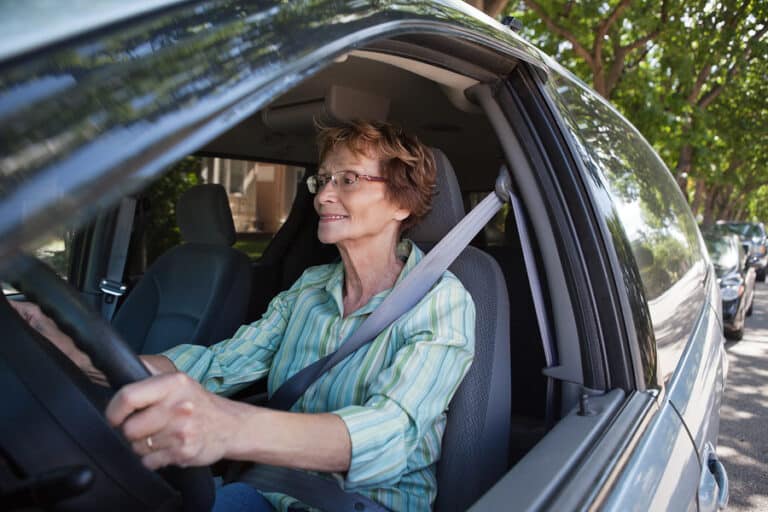For many older adults, driving represents independence and freedom. The ability to get in the car and go where they please allows seniors to maintain an active lifestyle and stay connected with family, friends, and their community. However, there comes a time when driving may no longer be safe. Recognizing when to step away from the driver’s seat can prevent accidents and ensure a senior’s well-being. When the time comes, personal care services can provide the support seniors need to continue living independently without driving.
5 Signs a Senior Should Stop Driving
While aging affects everyone differently, certain warning signs suggest that driving is no longer safe. Here are five indications that it may be time for a senior to stop driving.
1. Difficulty Seeing or Hearing
Clear vision and hearing are essential for safe driving. If a senior struggles to see street signs, traffic signals, or pedestrians, they are at greater risk of an accident. Hearing issues can also be dangerous, as they may not detect emergency sirens, honking horns, or other vehicles approaching. Even with prescription glasses or hearing aids, significant sensory impairments can make driving unsafe.
2. Frequent Close Calls or Accidents
Minor fender benders, scrapes, and near-misses can indicate that a senior is having trouble maintaining awareness on the road. If a senior starts receiving more traffic citations or has trouble judging distances when changing lanes or parking, these could be signs that their reaction time and decision-making abilities are declining.
3. Getting Lost or Confused While Driving
If a senior begins getting lost on familiar routes or has difficulty following directions, this could signal cognitive decline. Memory lapses and confusion while behind the wheel can lead to dangerous situations, such as driving the wrong way on a street or missing an important turn.
4. Trouble Controlling the Vehicle
Physical limitations can make it difficult to steer, brake, or accelerate properly. Arthritis, muscle weakness, and decreased coordination can lead to delayed responses, making it harder to react quickly to changing traffic conditions. If a senior struggles to keep the car in their lane, drifts unintentionally, or has difficulty pressing the pedals, it may be time to stop driving.
5. Increased Anxiety or Hesitation
Some seniors become nervous or overwhelmed while driving, particularly in heavy traffic or unfamiliar areas. If a senior frequently expresses fear about driving, avoids highways, or hesitates too long at stop signs and intersections, they may not feel confident behind the wheel. Anxiety while driving can increase the risk of accidents.
Why Driving is Important to Seniors
Driving is more than just a way to get from one place to another—it represents independence, freedom, and self-sufficiency. Losing the ability to drive can make seniors feel isolated, dependent on others, and disconnected from activities they enjoy. Without transportation, simple tasks like grocery shopping, attending doctor’s appointments, or visiting loved ones become challenging. The emotional impact of giving up driving can be significant, making it essential to provide alternatives that allow seniors to maintain their lifestyle.
How Personal Care Services Support Seniors Who No Longer Drive
When a senior stops driving, daily routines don’t have to come to a halt. Personal care services help seniors maintain independence and stay engaged in their community while ensuring they receive the assistance they need.
Safe and Reliable Transportation
Caregivers can provide transportation to medical appointments, social gatherings, religious services, and shopping trips. This allows seniors to stay active and involved in their favorite activities without worrying about how they will get there.
Assistance with Errands and Shopping
A caregiver can accompany a senior on errands or complete tasks on their behalf, such as picking up prescriptions or grocery shopping. This ensures that seniors have access to necessities without the stress of arranging transportation.
Companionship and Social Interaction
Losing the ability to drive can lead to feelings of loneliness and isolation. Caregivers provide companionship, engage seniors in conversation, and encourage participation in hobbies and community events. Staying socially active helps improve emotional well-being.
Help with Daily Tasks at Home
Without the ability to drive, some seniors may need extra help with cooking, housekeeping, and personal care. A caregiver can assist with these tasks, making it easier for seniors to continue living safely at home.
Platinum Care Group Helps Seniors Stay Independent Without Driving
Giving up driving is a major life change, but it doesn’t have to mean losing independence. With personal care services, seniors can continue their daily routines, attend important appointments, and enjoy social outings without worrying about transportation. Platinum Care Group is dedicated to providing compassionate care and reliable assistance, helping seniors live comfortably and confidently at home.


